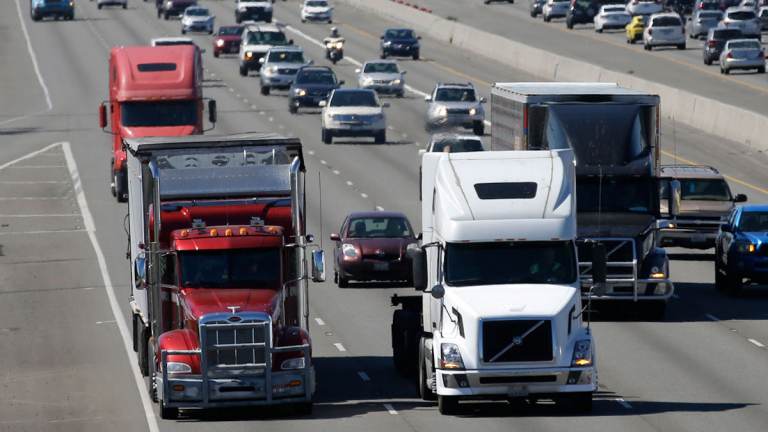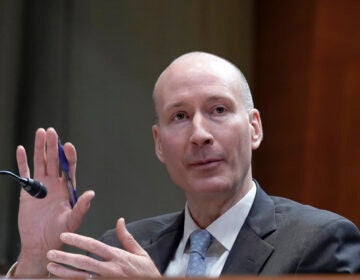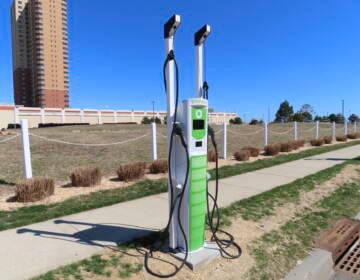To get more electric vehicles, N.J. wants more charging stations
New Jersey is pushing for new rules to grow its network of charging systems built for trucks and other heavy vehicles.

Trucks and cars travel down the highway. (AP Photo/Ted S. Warren, File)
This story originally appeared on NJ Spotlight.
The state is stepping up efforts to build the charging infrastructure needed to transition from diesel-belching trucks to zero-emission vehicles — a shift aimed at cleaning up polluted air in many urban areas and reducing climate-warming emissions.
A straw proposal released last week by the New Jersey Board of Public Utilities shows the agency wants to establish a comprehensive system for public access to charging stations on travel corridors and at workplaces. Those charging stations would help boost the numbers of electric medium- and heavy-duty trucks, as well as light-duty vehicles.
The proposal is viewed as complementary to a pending rule by the state Department of Environmental Protection that seeks to shift thousands of trucks — from delivery vans to buses to long-haul tractor trailers — to electric power. The move could curb one-third of the global-warming pollution from the transportation sector, which accounts for 40% of such pollution in New Jersey.
The new rule proposal would adopt the California “advanced truck rule,’’ requiring vehicle manufacturers to sell a certain percentage of zero-emission trucks instead of vehicles relying on fossil fuels. New Jersey would be the first state to adopt the program.
By 2030, according to a memorandum of understanding with 14 other states and the District of Columbia, the state has agreed to have 30% of all medium- and heavy-duty (MHD) vehicles that are sold be zero-emissions vehicles and 100% of such sales by 2050.
Electrifying the transportation sector is a key component of Gov. Phil Murphy’s clean-energy goals and the state’s target of reducing carbon-dioxide emissions by 80% below 2006 levels by mid-century.
Failing to electrify the vehicle fleet increases the cost of decarbonization from 2035 to 2050 by an average of $1.6 billion per year, according to research underlying the state’s 2019 Energy Master Plan.
“Diesel trucks from delivery vans to tractor-trailer rigs are some of the dirtiest vehicles on the roads,’’ said Doug O’Malley, director of Environment New Jersey. “This straw proposal is outlining the challenges ahead with the electrification of the sector.’’
Mary Barber, director of legislative and regulatory affairs for New York and New Jersey with the Environmental Defense Fund, agreed, specifically referring to the advanced truck rule. “It’s such an important rule,’’ she said. “It is really critical to commercial vehicles moving forward, and really improving the health of communities.’’
Who bears the cost?
The proposal uses a similar model to a past regulation adopted by the agency for light-duty vehicles. In that system, the state’s four electric utilities would be responsible for the wiring and backbone infrastructure to power a robust number of publicly accessible charging stations.
The new proposal incorporates the position of consumer advocates who want to keep utilities from relying on ratepayers to fund charging infrastructure — particularly when there are private companies already operating in the sector.
Unregulated electric-charging companies, using private capital, would be primarily responsible for installing, owning and operating the charging infrastructure. The BPU staff generally recommends that the cost of the charging equipment be borne by private investors, with recourse to ratepayer funds only in areas where the private sector fails to build such infrastructure.
The measure also proposes to create increased transportation options in low- and moderate-income and environmental justice communities, which critics have argued have been left out of the transition to cleaner technologies, including converting to solar power.
There are numerous hearings on the straw proposal scheduled during August and September.
“This straw proposal, along with the advanced truck rule, will put New Jersey as a leader with truck electrification,’’ O’Malley said.
WHYY is your source for fact-based, in-depth journalism and information. As a nonprofit organization, we rely on financial support from readers like you. Please give today.





